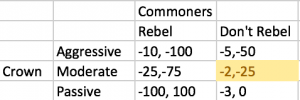A Game (Theory) of Thrones
Westeros is a terrible world. It’s a world where the cruel rule and the noble die. The crown lives extravagantly, enforcing its will on the common folk who take the abuse without revolution (since Robert’s Rebellion). But why is George R.R. Martin’s world so horrible? Interestingly, game theory can help answer this question.
Each character/house can be viewed as a player, and they have an almost uncountable number of strategies involving each of the other players. This is much more complicated than any game we’ve seen in class and is close to what an international relations game would look like––because it is one.
Because of its size, it is nearly impossible to model the the entire game (of thrones). It is much more useful to look at individual sub-games. One such sub-game involves the crown and the common folk. The article suggests that despite the awful state of the common folk, Westeros is actually in Nash equilibrium. Let’s examine this further.
To analyze this game, we have give each player strategies and payoffs. The players are the crown and the commoners. For simplification we’ll say the crown can either rule aggressively, moderately, or passively. The commoners can either rebel or not. If the commoners rebel and the crown is aggressive, the commoners will all be killed and the crown’s army will lose a some soldiers. If the commoners rebel and the crown is moderate, then most commoners will be killed but some might be taken prisoner, and the crown will lose more soldiers. If the commoners rebel and the crown is passive then the crown will be dethroned and the commoners will get a much better living situation. If the crown is aggressive and the commoners are passive, the crown will lose some subjects which they may care about, and many commoners will be killed. If they crown is moderate and the commoners are passive, the crown will lose less subjects and the less commoners will be killed. Finally if both players are passive, commoners will be unaffected and most likely fear the crown less (which is bad for the crown).
Here is the payoff matrix for this game:
So that’s why the commoners don’t rebel. But was this result obvious? The commoners can’t win so they don’t fight in the first place. But the article points out how this equilibrium can only stay stable as long as the crown is able to dominate all competitors (i.e. as long as it can sustain the negative payoffs)
More interestingly is how Game of Thrones highlights the shortcomings of game theory. In application, the payoffs of each strategy is uncertain––many people never reveal their true intentions. Also, at any given time the players never know how many other players there are or even exactly what games they’re involved in.
Source:

